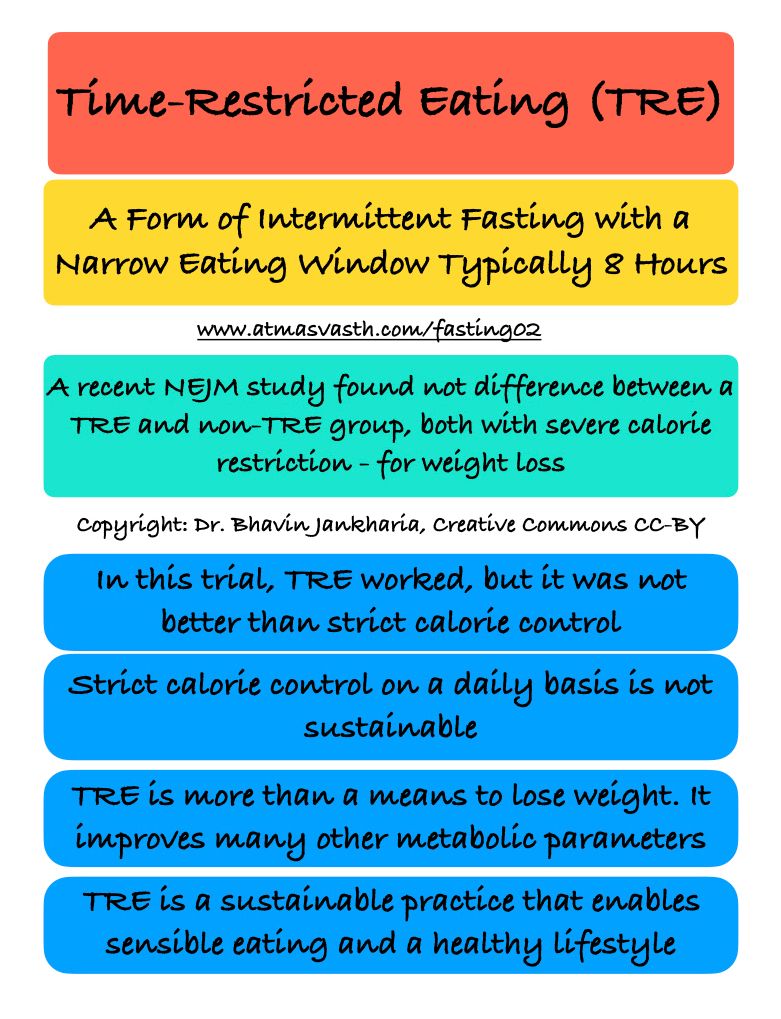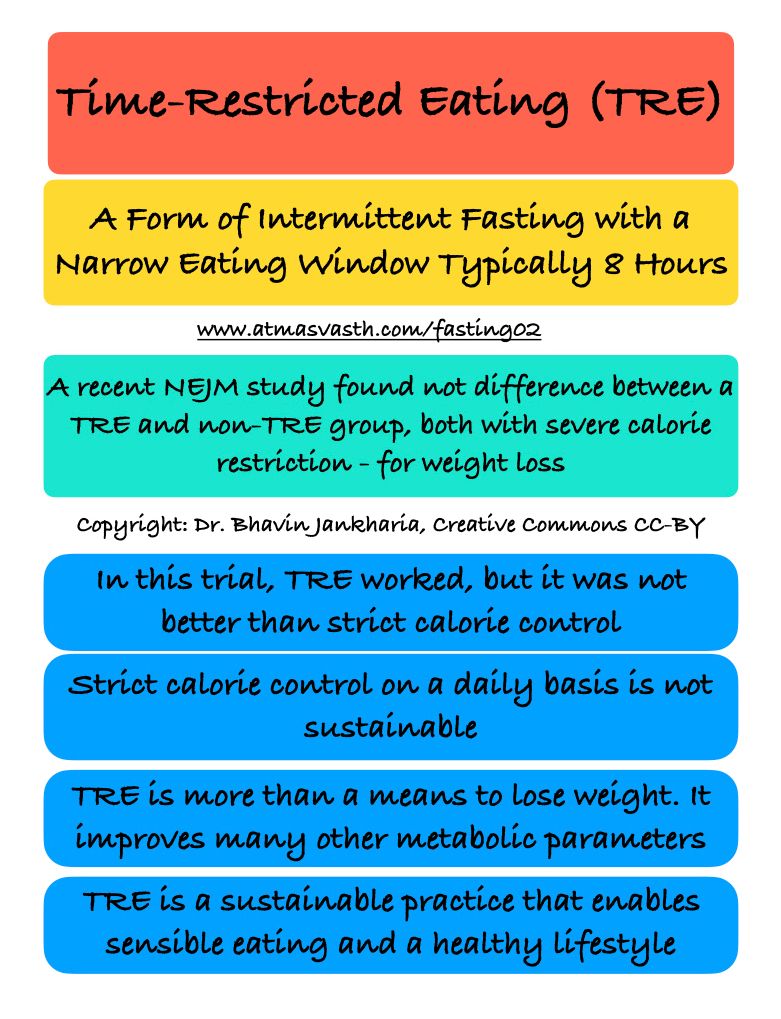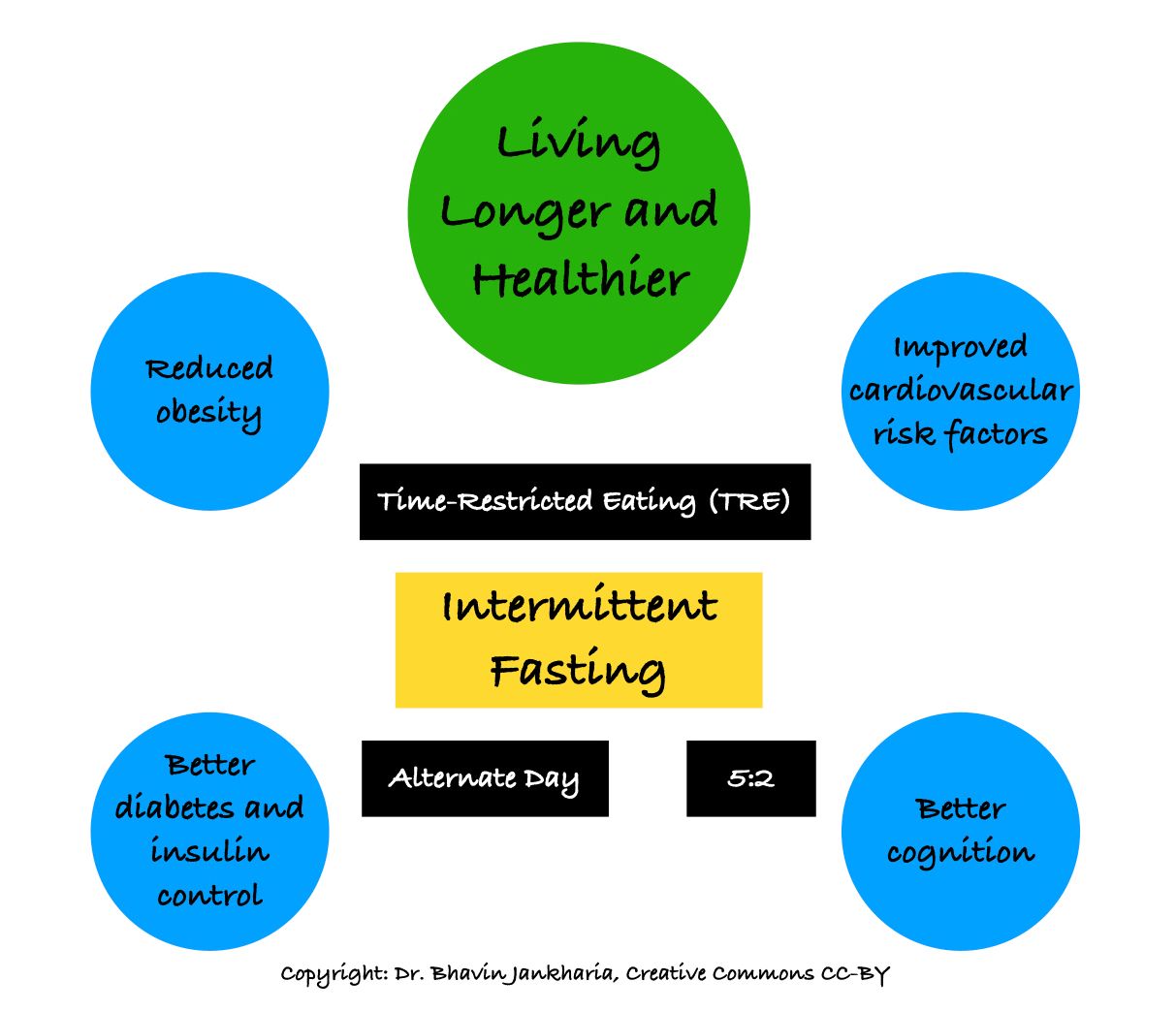How Time-Restricted Eating (TRE) is so Misunderstood by Most People Worldwide
Time-Restricted Eating (TRE) is sustainable practice that enables sensible eating and a healthy lifestyle

Some of you may have read this recent New York Times article with the sensational title, “Scientists Find no Benefit to Time-Restricted Eating”. The article refers to a New England Journal of Medicine (NEJM) paper headed by Deying Liu [1] and colleagues from China, titled “Calorie Restriction with or without Time-Restricted Eating in Weight Loss”, which studied two groups of people in China, one with time-restricted eating (TRE) of 8 hours and calorie restriction (1500-1800 kCal for men and 1200-1500 kCal for women), the other without TRE, but with the same calorie restriction.
One of the first things you would have noticed about Atmasvasth, is that I don’t write about weight loss. A focus on weight loss is a negative sum game that does not help us live long, healthy. Healthful ageing involves so much more than just focussing on kilograms and the weighing machine - physical activity is the cornerstone, followed by sensible eating, good sleep and the rest of the steps that I keep writing about week after week.
Nevertheless, weight loss if required, is best achieved with calorie restriction, whether it is by restricting food intake voluntarily or by performing bariatric surgery, which physically reduces a person’s ability to eat anything beyond small portions. Nonsurgical calorie restriction does not work in the long term. People keep yo-yoing or weight cycling [2] and eventually the body finds a way to get back to its set-point weight. Reducing food intake beyond what is natural messes up our bodies as much as eating too much and eating rubbish food - which is why what we need really is sensible eating…some basic control over the calories while avoiding ultra-processed foods, and eating more fruits, vegetables, nuts and maintaining a predominantly plant-based diet.
In Liu et al’s study [1], both the groups lost weight but with no difference between the two groups (the TRE and non TRE groups both lost a similar amount of weight). There was also no difference between the two groups when it came to blood pressure, blood sugar and other metabolic risk factors. This tells us that TRE with calorie restriction works, but it is not superior to calorie restriction without TRE.
The New York Times tom-tommed the results of this article to suggest that TRE does not work…which is so silly because the authors themselves say, “However, our results support a strategy of time-restricted eating combined with caloric intake restriction (prescribed according to current dietary guidelines) as a viable and sustainable approach for obesity management.” An accompanying editorial [3] by Drs. Laferrere and Panda commented that the non-TRE group actually had an eating window anyway of just 10 hours and 23 minutes, which means that the difference in the eating window between the two groups was just…2 hours.

TRE does work…but when it comes to weight loss, it is not better than simple calorie restriction as this study shows. Often it is assumed that one can eat ad libitum (any amount) with TRE, which makes no sense, because you can then potentially end up overeating and/or eating undesirable food.
Unfortunately, many trials comparing TRE to non-TRE have allowed TRE to be ad libitum, including the one I wrote about in my article on intermittent fasting, last May where for 12 weeks, the TRE group could eat as much and whatever they wanted, while the non-TRE group was given controlled portions. Unsurprisingly, the researchers did not find a significant difference between the two groups.
TRE is a sustainable practice, while daily calorie restriction is not. Pure calorie restriction of 1500-1800 calories per day, day after day, week after week, just does not work. Cheat days become more frequent and eventually the body rebels. In fact, recent data [2] suggests that physical activity can offset the downsides of obesity…the focus therefore has to be on a healthy sustainable lifestyle and not just calorie restriction.
Five days a week, I maintain a 16:8 schedule and eat between 1 PM and 9 PM, sometimes with an even smaller window. Because the eating window is just 8 hours, unless I decide to binge on junk food or dessert on a particular day, it is difficult to consume more than 2000 odd calories per day. This automatically leads to controlled eating as part of a sustainable lifestyle practice. Restricting the eating window is not difficult and can be done gradually over a few months (10:14 then 12:12 then 14:10 and then 16:8 and perhaps even 18:6, or simply let’s say eating just between sunrise and sunset in the tropical countries like some Jains do).
I repeat. Intermittent fasting of all kinds including TRE is not and should not be just about weight loss. TRE is a sustainable lifestyle choice that allows us to eat sensibly and perhaps also allows us to control our blood pressure, blood sugar and other metabolic parameters.
Previous Article on Intermittent Fasting

Footnotes
1. Liu D et al. N Engl J Med. 2022 Apr 21;386(16):1495-1504.
2. Gaesser GA, Angadi SS. Obesity treatment: Weight loss versus increasing fitness and physical activity for reducing health risks. iScience. 2021 Sep 20;24(10):102995. d
3. Laferrère B, Panda S. N Engl J Med. 2022 Apr 21;386(16):1572-1573.
Atmasvasth Newsletter
Join the newsletter to receive the latest updates in your inbox.


